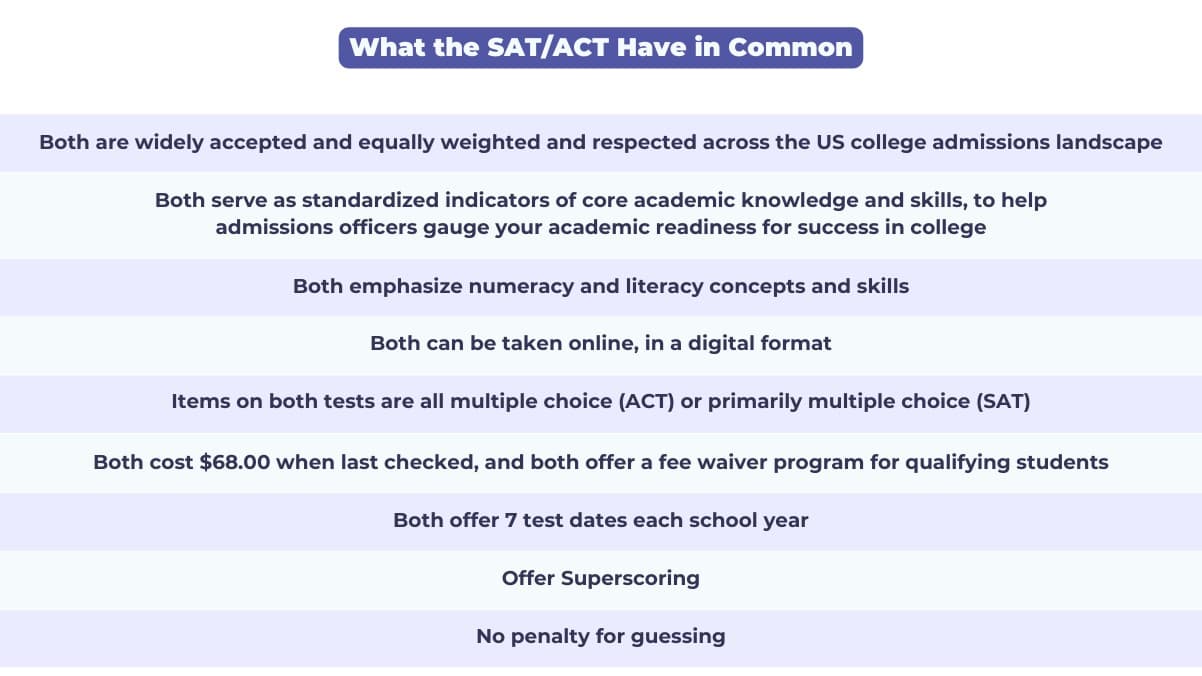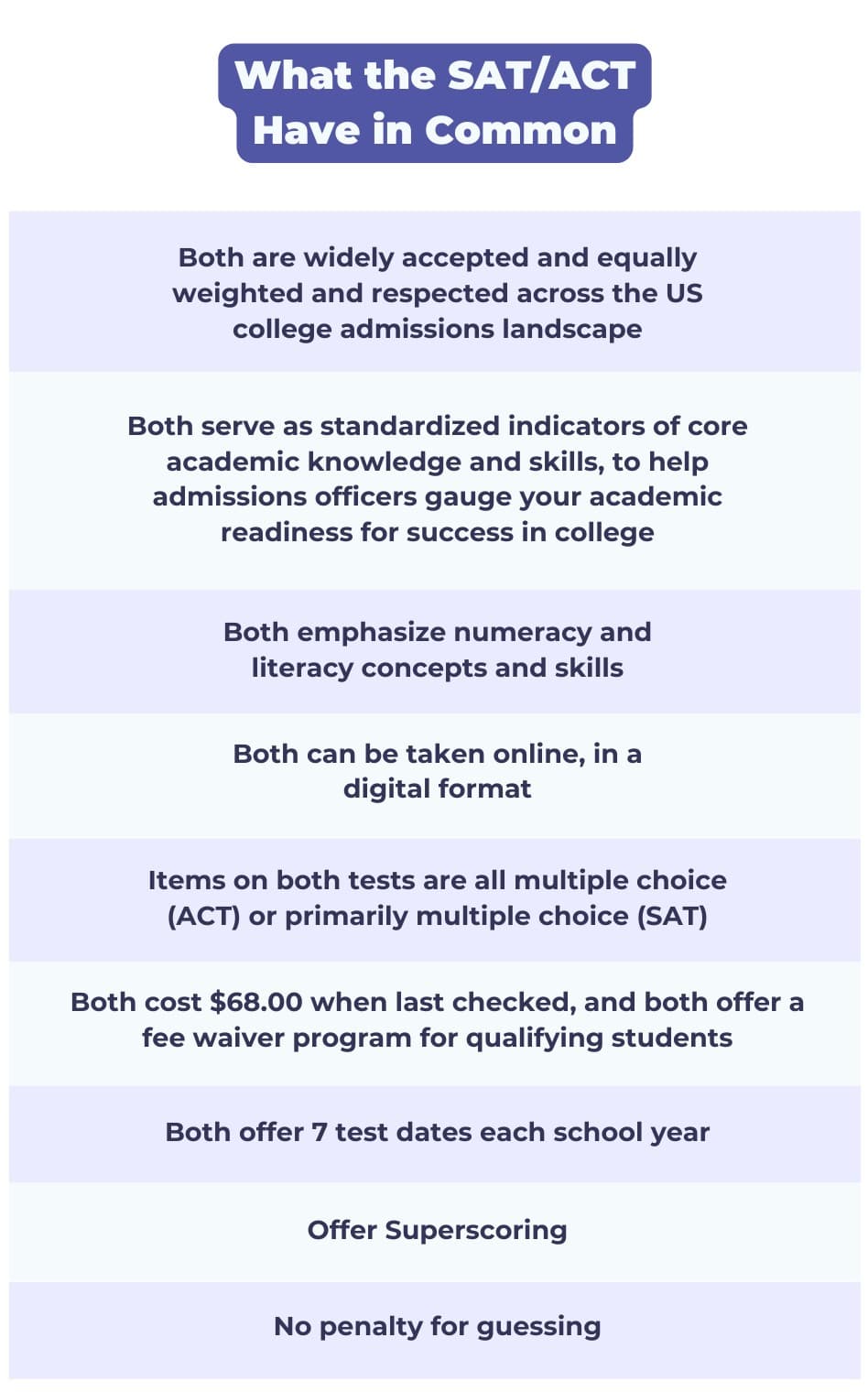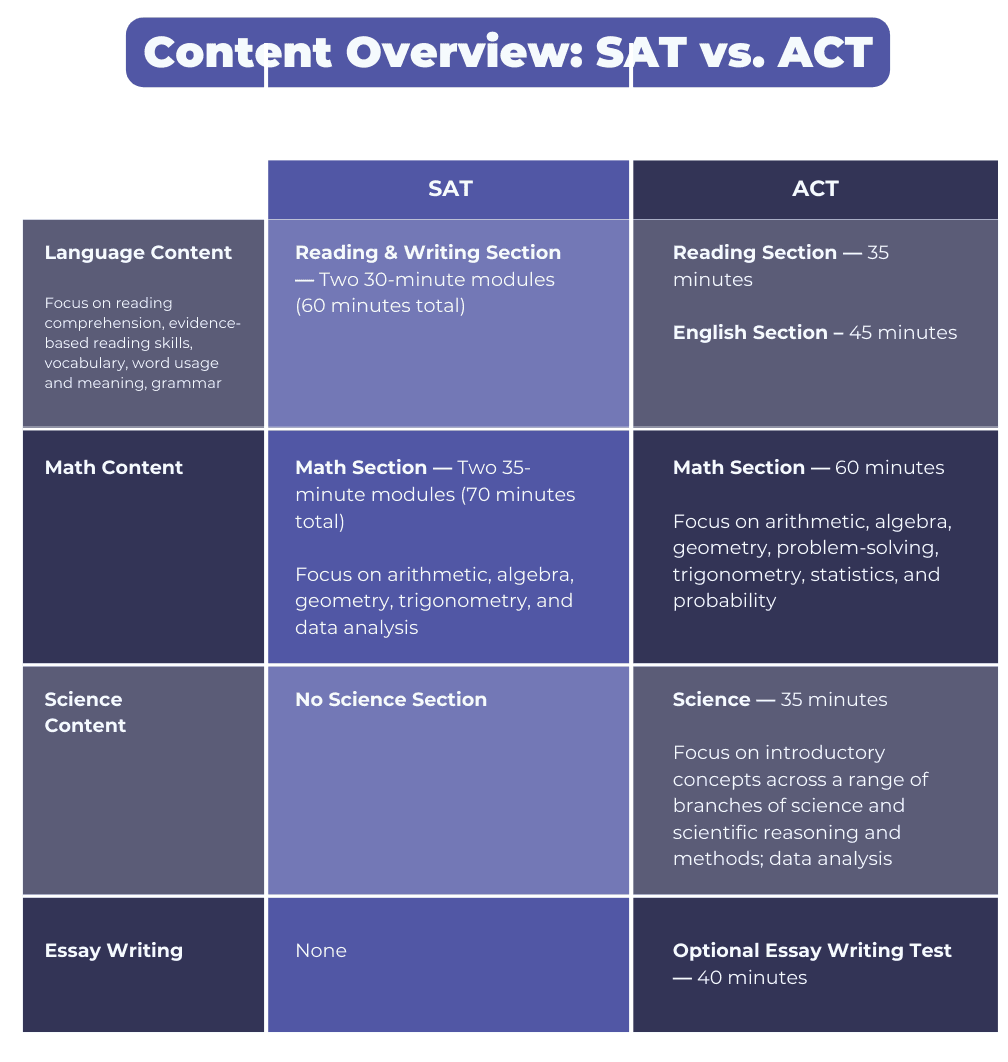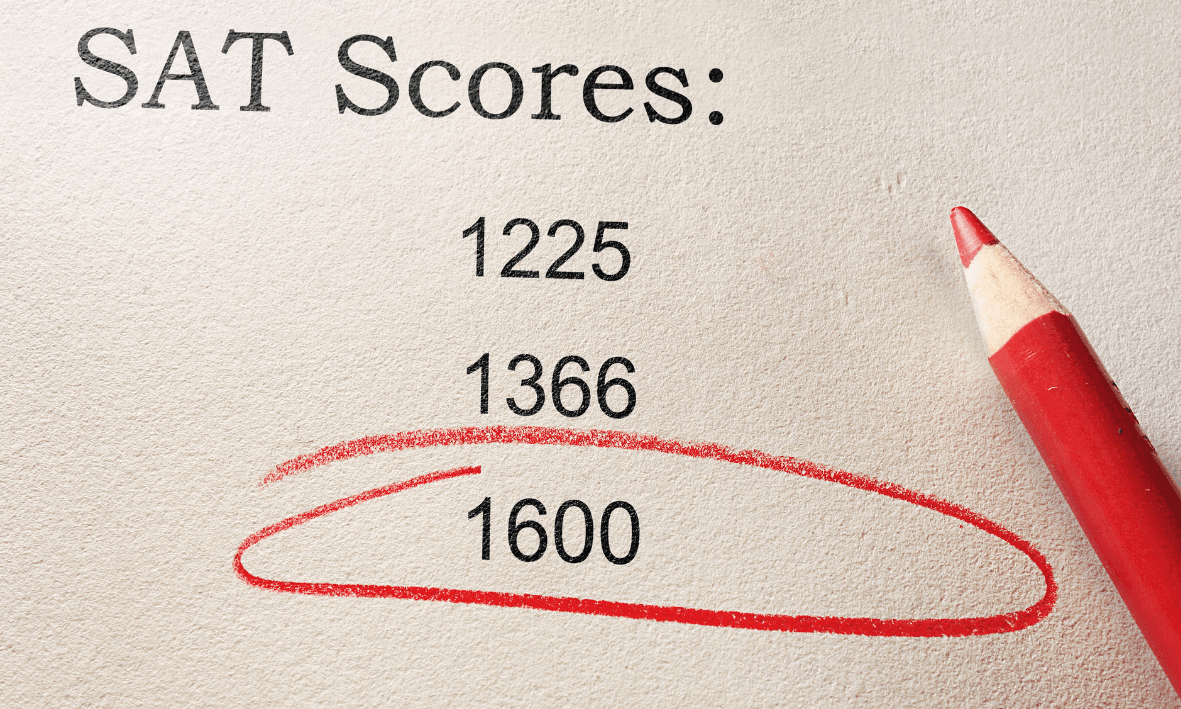SAT vs. ACT: Apa Perbedaannya dan Tes Mana yang Harus Anda Ambil?

Summary
Postingan ini mengeksplorasi fitur utama dan format tes yang membedakan SAT dari ACT, menyoroti perbedaan utama yang kemungkinan mempengaruhi kesulitan tes, berdasarkan kekuatan dan bakat individu pengambil tes yang berbeda.
Baik SAT maupun ACT diterima dan dihormati secara luas di dunia penerimaan perguruan tinggi AS. Jadi siswa benar-benar dapat memilih untuk mengambil salah satu, tetapi siswa bertanya-tanya apakah salah satu tes lebih mudah atau lebih sulit.
Menentukan apakah Anda akan memiliki keunggulan pada SAT atau ACT tergantung pada beberapa perbedaan — banyak yang cukup halus — dan pada kekuatan individu Anda sendiri serta preferensi dalam mengambil tes.
SAT vs. ACT: Perbedaan Utama dalam Kesulitan Tes
Setiap perbedaan tunggal antara SAT dan ACT, jika dipertimbangkan sendiri, mungkin tidak banyak membantu Anda memutuskan tes mana yang paling cocok untuk Anda. Mengapa? Karena banyak perbedaan yang halus dan beberapa dapat saling meniadakan ketika Anda mempertimbangkannya secara keseluruhan dan dalam cahaya kekuatan akademis dan preferensi pengambilan tes Anda sendiri.
Namun, dengan melihat beberapa faktor bersama-sama, seperti perbedaan dalam materi pelajaran penekanan, kesulitan bahasa, struktur, dan kecepatan... Anda mungkin mulai melihat bahwa satu tes menjadi pilihan yang lebih baik untuk Anda secara pribadi.
Tabel di bawah ini menyoroti perbedaan yang cenderung mempengaruhi kesulitan pengambilan tes bagi banyak siswa.
SAT vs. ACT: Kesulitan Mengambil Tes
| SAT | ACT | |
|---|---|---|
| Penjadwalan & Durasi | Memerlukan waktu lebih sedikit untuk seluruh tes; memberi Anda lebih banyak waktu per pertanyaan | Memerlukan waktu lebih lama untuk seluruh tes; memberi Anda lebih sedikit waktu per pertanyaan |
| Format Pertanyaan | Semua item adalah pilihan ganda kecuali beberapa item matematika, di mana Anda harus mengisi jawabannya | Format pilihan ganda saja (kecuali untuk tes menulis esai opsional) |
| Berpikir Kritis | Sebagian besar ahli setuju bahwa pertanyaan SAT rata-rata memerlukan analisis dan penalaran kritis yang lebih mendalam | Pertanyaan biasanya dianggap lebih sederhana dan lebih langsung |
| Ilmu Pengetahuan dan Analisis Ilmiah | Tidak ada bagian terpisah untuk ilmu pengetahuan | ACT memiliki subtes sains yang berdiri sendiri yang mencakup: - Konsep pengantar dalam ilmu kehidupan, ilmu bumi, dan ilmu fisika - Metode ilmiah, menganalisis klaim dan data, serta penalaran ilmiah |
| Pemahaman Membaca | Pertanyaan membaca SAT mungkin, rata-rata, memerlukan analisis yang lebih mendalam, tetapi bacaan rata-rata lebih pendek dan formatnya lebih sederhana, dengan biasanya hanya satu pertanyaan per bacaan Lebih menekankan pada membaca yang mencakup grafik, tabel, dan analisis data | Bacaan lebih panjang rata-rata, tetapi sering kali fokus pada aspek pemahaman membaca yang lebih langsung dibandingkan dengan bagian membaca SAT |
| Bahasa Inggris | Bagian menulis (semua pilihan ganda) menguji tanda baca, tata bahasa, dan keterampilan komposisi Kosakata diuji "dalam konteks" dalam berbagai komponen tes Membaca dan Menulis Menyajikan kosakata yang lebih menantang (dalam komponen membaca dan menulis), seperti kata-kata yang lebih teknis, langka, atau kuno Menetapkan hanya satu pertanyaan per bacaan dan bacaan cenderung lebih pendek dibandingkan dengan ACT | ACT memiliki tes Bahasa Inggris mandiri dengan bacaan yang lebih panjang yang dapat memiliki banyak pertanyaan terkait Menguji kosakata, penggunaan kata, tata bahasa, dan struktur serta konvensi retorika Beberapa pertanyaan (tentang elemen gaya retorika dan penggunaan kata) mungkin melibatkan tingkat nuansa yang membuatnya menantang |
| Matematika | Lebih menekankan pada penalaran matematis dan pemecahan masalah Soal cerita atau skenario dan pertanyaan pemecahan masalah yang lebih panjang dan kompleks Kalkulator yang memenuhi syarat diizinkan Rumus disediakan untuk referensi | Pertanyaan matematika yang lebih langsung, tetapi lebih banyak konten yang menekankan geometri dan statistik (dibandingkan dengan SAT) Kalkulator yang memenuhi syarat diizinkan Rumus tidak disediakan untuk referensi |
Seperti yang Anda lihat, beberapa perbedaan benar-benar menonjol, seperti tes ACT yang memiliki bagian sains yang wajib, tetapi tidak pada SAT. Atau, ACT tidak menyertakan rumus untuk bagian matematika, sementara SAT menyediakannya.
Demikian pula, ACT mungkin memiliki pertanyaan pemahaman bacaan yang lebih langsung, tetapi sering kali dengan beberapa pertanyaan yang terlampir pada satu dan lebih panjang bacaan, dibandingkan dengan SAT.
SAT vs. ACT: Fitur yang Mereka Miliki Bersama


Tidak. Baik SAT maupun ACT diterima dan dihormati secara luas di seluruh lanskap penerimaan perguruan tinggi di AS.
Awalnya, SAT dianggap lebih sebagai tes kemampuan akademik umum, sementara ACT lebih dimaksudkan sebagai tes penempatan yang mengukur penguasaan konsep-konsep sekolah menengah. Saat ini, perbedaan ini sebagian besar telah kabur.
Seperti yang Anda lihat, kedua tes memang memiliki banyak kesamaan.
- Keduanya berfokus pada literasi, numerasi, dan keterampilan berpikir kritis berbasis bukti terutama
- Keduanya dapat diambil secara digital
- Keduanya memungkinkan superscoring
Namun, sekarang saatnya untuk melihat struktur keseluruhan, di mana ada beberapa perbedaan yang menonjol. Namun, ini mungkin bukan perbedaan yang benar-benar membantu Anda memutuskan tes mana yang paling cocok untuk Anda.
SAT vs. ACT: Struktur Tes
Gambaran Umum Struktur Tes
| SAT | ACT | |
|---|---|---|
| Opsi Pengujian | SAT HANYA dalam format digital (online) | ACT masih menawarkan opsi kertas/pensil DAN opsi digital (online) |
| Format Adaptif vs. Linear | SAT menggunakan format tes adaptif — tingkat kesulitan menyesuaikan naik/turun, berdasarkan bagaimana Anda menjawab pertanyaan sebelumnya | ACT bersifat linear (non-adaptif), baik versi kertas maupun online |
| Jumlah Bagian | SAT memiliki 2 bagian: 1. Membaca & Menulis 2. Matematika | ACT memiliki 4 bagian: 1. Bahasa Inggris 2. Matematika 3. Membaca 4. Sains Ditambah Ujian Esai OPSIONAL |
| Waktu dan Waktu per Pertanyaan | Memakan waktu 2 jam dan 14 menit MEMBACA: 71 detik per pertanyaan (64 menit/54 pertanyaan) MATEMATIKA: 95 detik per pertanyaan (70 menit/44 pertanyaan) | Membutuhkan 2 jam dan 55 menit MEMBACA: 67 detik per pertanyaan (40 menit/36 pertanyaan) MATEMATIKA: 67 detik per pertanyaan (40 menit/36 item) |
| Format Pertanyaan | Sebagian besar pilihan ganda — beberapa pertanyaan matematika mengharuskan Anda mengisi jawaban | Semua pilihan ganda |
Perbedaan utama di sini adalah bahwa ACT masih menawarkan opsi kertas/pensil, tetapi tidak untuk SAT. Mungkin karena alasan ini, ACT digital adalah linear, sementara SAT adalah adaptif. Fitur bagus dari format adaptif adalah bahwa mereka dapat lebih baik menyelaraskan item tes dengan tingkat kemampuan peserta tes, untuk lebih cepat menentukan skor dan peringkat yang akurat.
Fakta bahwa itu linear mungkin menjadi salah satu alasan mengapa sesi tes ACT memakan waktu sekitar 40 menit lebih lama secara keseluruhan (tidak termasuk tes menulis ACT opsional).
Sedangkan untuk pengaturan waktu, SAT cenderung memberi Anda keunggulan, memberi Anda beberapa detik ekstra per pertanyaan.
Tes tradisional seperti ACT menggunakan format linear, yang berarti setiap siswa menjawab set pertanyaan yang sama dalam urutan tetap. Namun, SAT bersifat adaptif dalam format digitalnya. Saat Anda menjawab pertanyaan, tes menyesuaikan—memberikan pertanyaan yang lebih sulit atau lebih mudah berdasarkan jawaban Anda. Ini membantu menentukan tingkat keterampilan Anda dengan lebih efisien, yang mungkin menjadi salah satu alasan mengapa SAT lebih pendek daripada ACT!
SAT vs. ACT: Konten Utama
Berikut sudut pandang berbeda: perbandingan yang berfokus pada konten materi pelajaran.


Sorotan Konten Utama — SAT vs. ACT
- Membaca & Bahasa: Dalam hal pemahaman bacaan, tata bahasa, dan keterampilan komposisi, kedua tes memiliki konten yang serupa, tetapi mengaturnya secara berbeda.
- Sains: ACT memiliki bagian yang berfokus pada sains; SAT tidak. Perlu diingat bahwa sains ACT mencakup berbagai disiplin ilmu sains tetapi sebagian besar hanya konsep dasar, dengan penekanan utama pada analisis data berbasis bukti dan penalaran ilmiah.
- Menulis: Tidak ada penulisan yang diperlukan untuk SAT. ACT menawarkan Anda Tes Menulis Esai opsional. Perlu diingat bahwa hampir tidak ada universitas terkemuka yang mewajibkan pelamar mengikuti tes esai ACT. Jadi apakah itu berguna? ACT.org menyarankan bahwa ini menawarkan Anda alternatif untuk menunjukkan kemahiran bahasa jika Anda belum mendapatkan nilai tinggi dalam mata pelajaran seni bahasa Anda.
SAT vs ACT: Seberapa Berbedakah Pertanyaan dengan Jamie Beaton
Membandingkan Skor SAT dan ACT & Rentang Skor
Bagan Konversi Skor SAT/ACT
| Skor Komposit SAT | Skor Komposit ACT |
|---|---|
| 1600 | 36 |
| 1560-1590 | 35 |
| 1520-1550 | 34 |
| 1490-1510 | 33 |
| 1450-1480 | 32 |
| 1420-1440 | 31 |
| 1390-1410 | 30 |
| 1350-1380 | 29 |
| 1310-1340 | 28 |
| 1280-1300 | 27 |
| 1240-1270 | 26 |
| 1200-1230 | 25 |
| 1160-1190 | 24 |
| 1130-1150 | 23 |
| 1100-1120 | 22 |
| 1060-1090 | 21 |
| 1020-1050 | 20 |
| 980-1010 | 19 |
| 940-970 | 18 |
| 900-930 | 17 |
| 860-890 | 16 |
| 810-850 | 15 |
| 760-800 | 14 |
| 720-750 | 13 |
| 630-710 | 12 |
| 560-620 | 11 |
Sementara perguruan tinggi dan universitas di AS cenderung mengambil pendekatan holistik untuk penerimaan — sebagai lawan dari menetapkan persyaratan ketat untuk skor tes atau GPA — skor SAT yang baik adalah antara 1510 dan 1560, dan skor ACT yang baik antara 33 dan 36 berdasarkan rentang skor rata-rata pelamar ke sekolah yang sangat selektif.
SAT dan ACT memiliki skala penilaian yang sangat berbeda. SAT menggunakan skala kumulatif 1600 poin, sedangkan ACT menggunakan skala kumulatif 36 poin. Pada akhirnya, sekolah-sekolah tahu bagaimana skala yang berbeda ini dibandingkan satu sama lain, membuat faktor ini menjadi tidak relevan secara keseluruhan. Namun, beberapa ahli berpendapat bahwa ACT, karena format dan skala 36 poinnya, memberi Anda peluang lebih baik jika Anda mengejar skor sempurna!
Secara statistik, lebih mudah mendapatkan skor sempurna pada ACT, tetapi setiap siswa berbeda. Konten untuk setiap tes berbeda. Namun, secara umum, pertanyaan ACT cenderung lebih langsung, sedangkan pertanyaan SAT cenderung lebih rumit.
- Vincent Lim, US Admissions Strategist, Crimson EducationSAT vs. ACT: Menunjukkan Kemampuan Bahasa Inggris
Banyak siswa internasional perlu menunjukkan kemampuan bahasa Inggris di antara persyaratan penerimaan lainnya. Tahukah Anda bahwa banyak sekolah mengizinkan Anda menggunakan skor pada tes Bahasa Inggris ACT atau tes Membaca/Menulis SAT sebagai bukti kemampuan bahasa Inggris?
Kebijakan dapat berbeda secara luas dari satu sekolah ke sekolah lainnya, jadi pastikan untuk memeriksa dengan setiap sekolah yang Anda lamar.
Contoh Patokan Skor SAT & ACT untuk Kemampuan Bahasa Inggris
| Sekolah | Tolok Ukur Skor untuk Persyaratan Kemahiran Bahasa Inggris |
|---|---|
| Universitas California (semua kampus) | Skor 24 atau lebih tinggi pada tes Bahasa Inggris ACT |
| Columbia | Skor 700 atau lebih tinggi pada tes SAT Membaca/Menulis, atau 29 atau lebih tinggi pada bagian Membaca atau Bahasa Inggris dari ACT |
| USC | Skor 650 atau lebih tinggi pada tes SAT Membaca/Menulis, atau 27 atau lebih tinggi pada tes Bahasa Inggris ACT |
| Universitas Michigan | Skor 510 atau lebih tinggi pada tes SAT Membaca/Menulis, atau 18 atau lebih tinggi pada tes Bahasa Inggris ACT |
| Universitas Washington | Skor 580 atau lebih tinggi pada tes SAT Membaca/Menulis, atau 22 atau lebih tinggi pada tes Bahasa Inggris ACT |
SAT vs. ACT: Poin Penting untuk Pengambilan Keputusan
1. Poin Penting untuk Tantangan Membaca & Bahasa
- Sebagian besar ahli tidak melihat perbedaan besar antara bagian bahasa SAT dan ACT.
- Beberapa ahli berpikir bahwa bagian bahasa SAT mungkin sedikit lebih mudah bagi mereka yang kurang mahir dalam bahasa Inggris dan/atau pemahaman bacaan.
- Yang lain berpikir bahwa pertanyaan Membaca dan Bahasa ACT lebih mudah rata-rata, tetapi mencatat bahwa ada lebih banyak pertanyaan secara keseluruhan dan waktu yang dialokasikan per pertanyaan lebih sedikit.
2. Poin Penting untuk Tantangan Matematika
- Beberapa pertanyaan matematika SAT yang menantang mengharuskan Anda untuk mengisi jawaban, bukan memilih dari daftar, menghilangkan opsi “menebak” atau “memilih” jawaban.
- SAT dan ACT menguji banyak konsep matematika inti yang sama, tetapi SAT memiliki fokus yang lebih kuat pada aljabar, sementara ACT mencakup rentang yang lebih luas (termasuk lebih banyak geometri, statistik, dan trigonometri) pada tingkat pemahaman yang lebih dasar.
- SAT sering menuntut pengetahuan konseptual yang lebih dalam dan penalaran matematika yang lebih kompleks dengan pertanyaan berbasis teks yang lebih panjang.
- SAT memberikan lebih banyak waktu per pertanyaan (laju lebih lambat); ACT memberi Anda lebih sedikit waktu per pertanyaan (laju lebih cepat).
- SAT menyediakan rumus pada tes; ACT tidak.
- Baik SAT maupun ACT mengizinkan penggunaan kalkulator yang memenuhi syarat.
3. Poin Penting untuk Tantangan Sains
ACT memiliki bagian yang didedikasikan untuk sains, sedangkan SAT tidak. Jadi jika sains dan penalaran ilmiah bukan kekuatan Anda, ini mungkin menjadi poin yang mendukung untuk mengambil SAT.
Namun, perlu diingat bahwa SAT memang mencakup sejumlah kecil pertanyaan dengan beberapa konten sains — di seluruh bagian bahasa dan matematika — untuk menguji keterampilan membaca berbasis bukti, keterampilan analisis data, dan keterampilan matematika, termasuk dalam bagan, tabel, dan grafik.
SAT vs. ACT: Memutuskan Dengan Bantuan Tes Latihan
Saya telah melakukan yang terbaik untuk menyoroti perbedaan utama untuk membantu Anda memilih tes terbaik sesuai preferensi Anda. Sayangnya, kebanyakan siswa tidak akan menemukan jawaban yang jelas dalam semua ini, dan terkadang bahkan para ahli tidak setuju tentang saran apa yang harus diberikan!
Untungnya, cara lain untuk menguji air, bisa dikatakan, adalah dengan bantuan tes latihan.
Pertanyaan sampel dan bahkan tes latihan komprehensif tersedia secara luas untuk SAT dan ACT, menjadikannya cara yang mudah dan pasti untuk melihat sendiri apakah Anda benar-benar lebih menyukai satu tes daripada yang lain.
Menemukan Tes Latihan Online
Untuk cara yang sangat cepat untuk mencoba kedua tes, Crimson Education menawarkan Tes Latihan Mini SAT/ACT online.
Ini adalah sumber daya gratis, bahkan jika Anda belum menjadi bagian dari jaringan Crimson (belum)!
Gunakan tautan ini untuk pergi ke sana sekarang…
Pemikiran Akhir
Jika Anda merasa sulit melihat perbedaan besar antara kedua tes ini, Anda tidak sendirian! Namun, jika Anda ingin lebih yakin bahwa Anda memilih tes yang paling sesuai untuk Anda, gunakan contoh pertanyaan tes SAT dan contoh pertanyaan tes ACT untuk lebih memahami perbedaan halus dari tes tersebut.
Jika Anda ingin jalan pintas untuk mencoba kedua tes, lihat Tes Latihan SAT dan ACT Online dari Crimson.
Juga penting, setelah Anda memilih tes yang Anda sukai, Anda akan ingin menyisihkan waktu untuk persiapan dan latihan sebelum hari tes yang dijadwalkan. Bagi sebagian besar siswa, persiapan yang menyeluruh mungkin lebih penting daripada tes mana yang Anda ambil jika Anda benar-benar ingin mencapai skor yang lebih tinggi!
Lihat sumber daya ini untuk informasi dan tips bermanfaat tentang cara mempersiapkan:
Bagaimana Cara Belajar untuk SAT: Tips dan Strategi untuk Sukses
Bagaimana Cara Belajar untuk ACT: Tips dan Strategi untuk Sukses
Akhirnya, jika Anda belum menjadi bagian dari jaringan Crimson, Anda melewatkan strategi dan dukungan yang lebih dipersonalisasi untuk perjalanan kuliah Anda, belum lagi banyak alat eksklusif dan sumber daya lebih eksklusif yang tersedia di Aplikasi Crimson kami. Jika Anda memiliki pertanyaan tentang model tim kami, pendekatan yang dipersonalisasi, tingkat layanan yang dapat dipilih, atau langkah Anda selanjutnya... jadwalkan sesi umpan balik gratis dengan seorang ahli strategi Crimson yang ramah!


